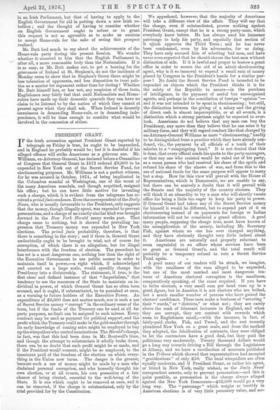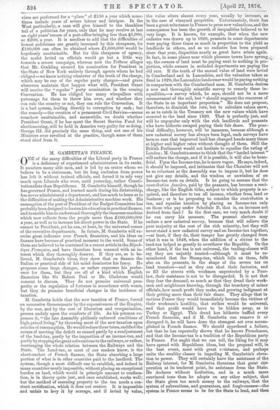PRESIDENT GRANT.
IF the fresh accusation against President Grant reported by telegraph on Friday is true, he ought to be impeached, and in England he probably would be ; but it is doubtful if his alleged offence will strike Americans as a grievous one. Mr. Williams, ex-Attorney-General, has declared before a Committee of Congress that General Grant in 1872 ordered £6,000 to be
.expended in New York out of the Secret Service Fund, for electioneering purposes. Mr. Williams is not a perfect witness,
for he was accused in October, 1874, of being implicated in the Columbus scandal at Washington, one of the worst of the many American scandals, and though acquitted, resigned his office ; but he can have little motive for inventing such a charge, which it is evident from the telegrams has re- ceived a prima' facie credence. Even the correspondent of the Daily News, who is usually favourable to the President, only suggests that the money, though illegally spent, was expended to prevent personations, and a charge of an exactly similar kind was brought forward in the New York Herald many weeks past. That charge came to nothing, but it showed the prevailing im- pression that Treasury money was expended in New York elections. The primci facie probability, therefore, is that there is something in the story; and if there is, General Grant undoubtedly ought to be brought to trial, not of course for corruption, of which there is no allegation, but for illegal interference with the freedom of election. The precedent he has set is a most dangerous one, nothing less than the right of the Executive Government to use public money in order to maintain itself in power,—a right which, if acknowledged and exerted on a large scale, would speedily change the Presidency into a dictatorship. The statement, if true, is the first clear and defined instance of that " Imperialism," that tendency to use the resources of the State to maintain an in- dividual in power, of which General Grant has so often been accused, and it ought, if substantiated, to be punished at once, as a warning to future holders of the Executive Power. An expenditure of £6,000 does not matter much, nor is such a use of Secret Service money " corrupt " in the ordinary sense of the term, but if the funds of the Treasury can be used at all for party purposes, no limit can be assigned to such misuse. Every contract may be used as payment for political support, and the profit which the Treasury could make in the gold-market through its early knowledge of coming sales might be employed to buy up the wirepullers who control nominations. The Herald's charge, in fact, was that this had been done in Mr. Boutwell's time, and though the attempt to substantiate it wholly broke down, there can be no doubt that such profit might be so made, and if the President would consent, might be so employed, to the imminent peril of the freedom of the election on which every- thing in the Union now turns. The danger is the greater, because such a use of money might be made by a man who disdained personal corruption, and who honestly thought his own election, or at all events, his own possession of a fair chance of being elected, essential to the well-being of the State. It is one which ought to be removed at once, and it 'can be removed, if the charge is substantiated, only by the trial provided for by the Constitution. We apprehend, however, that the majority of Americans will take a different view of the affair. They will say that the charge, even if substantiated, proves nothing against President Grant, except that he is a strong party-man, which everybody knew before. He has always used his immense patronage to help his party, and especially that section of it which approves the Third Term ; and he has never been condemned, even by his adversaries, for so doing. They have only accused him of selecting bad men, and have never even expected that he should choose the best men without distinction of side. If it is lawful and proper to bestow a great office in order to secure the aid of an adroit electioneering agent, why is it so immoral to expend a small sum of money placed by Congress in the President's hands for a similar pur- pose ? No doubt the Secret Service Fund is intended to be expended on objects which the President thinks it is for the safety of the Republic to secure—in the purchase of intelligence, in the payment of useful but unrecognised agents, and perhaps in the conciliation of foreign " opinion "— and it was not intended to be spent in electioneering ; but still, the distinction between the giving of a salary and the giving of direct cash is almost imperceptible, or at all events, is a distinction which a strong partisan might be expected to over- look. Americans do not believe that any man can buy the Presidency, any more than they believe that he can seize it by military force, and they will regard conduct like that charged by ex-Attorney-General Williams as mere "electioneering," hardly to be distinguished from a practice which they have already con- doned, viz., the payment by all officials of a tenth of their salaries to a "campaigning fund." It is not denied that this is done, that every official sends his quota to the party-managers, or that any one who resisted would be ruled out of his party, as a mean person who had received his share of the spoils and refused his share of the sinews of war, and from this to the use of national funds for the same purpose will appear to many but a step. How far this view will prevail with the House of Representatives, which is Democratic, we are unable to say, but there can be scarcely a doubt that it will prevail with the Senate and the majority of the country electors. They will think it an absurdity to try a man who will shortly vacate office for being a little too eager to keep his party in power. If General Grant had taken any of the Secret Service money for himself it would be different, but to expend part of it on electioneering instead of on payments for foreign or Indian information will not be considered a grand offence. A good many people, supposing the charge true, must have known of the misapplication of the money, including Mr. Secretary Fish, against whom no one has ever charged anything, and they have obviously thought very little indeed about
it. Americans are naturally and properly reluctant to seem ungrateful to an officer whose services have been so great as General Grant's, and the total result will probably be a temporary refusal to vote a Secret Service Fund again.
A good many of our readers will be struck, we imagine, with the smallness of the sum alleged to be expended, but one of the most marked and most dangerous fea- tures of American electoral corruption is the smallness, comparatively speaking, of the sums required. If you have to bribe electors, a very small sum per head runs up to a great figure, but in America it is not electors who are bribed, but a much smaller number of persons who have gained the electors' confidence. These men make a business of "securing " their " wards," or " districts," or what not ; they are rarely above the rank of itinerant lecturers in England, and when they are corrupt, they are content with rewards which seem to Englishmen small,—with the incomes, in fact, of fairly-paid. clerks. Fisk, and Tweed, and the rest recently plundered New York on a great scale, and from the method they adopted, the falsification of contracts, they were obliged to let the contractors have a good deal, but they paid the politicians very moderately. Twenty thousand dollars would go a long way towards driving a Bill through the Legislature at Albany, and we have a recollection of accounts published in the Tribune which showed that representatives had accepted "gratifications" of only £50. The local wirepullers are often equally moderate, and if President Grant, or rather his agent, or friend in New York, really wished, as the Daily News' correpondent asserts, only to prevent personation—and this is quite possible, as personation is the charge always alleged against the New York Democrats—$32,000 would go a very long way. The " patronage " which weighs so terribly in American elections is of very little pecuniary value, and ser- vices are performed for a "place" of £150 a year which some- times include years of severe labour and intrigue. In the West particularly, a man will give himself to the thankless toil of a politician for years,'only that he may receive at last an eight years' tenure of a post-office bringing less than $1,000, -or £200, a year. It is needless to add that the difficulties of honest politicians are greatly increased by this cheapness, for £100,000 can often be obtained where £1,000,000 would be hopelessly unattainable. But for this cheapness of agency, the mulct levied on officials would go but a little way towards a severe campaign, whereas now the Tribune alleges that Mr. Conkling secured his nomination for President in the State of New York entirely through agents whom he had - obliged—we know nothing whatever of the truth of the charge, which may be one of the regular party charges—and grave observers maintain that happen what will, President Grant will receive the "regular" party nomination in the coming Convention. He has obliged too many wirepullers with patronage for them to throw him over, and whether they can rule the country or not, they can rule the Convention. It is a bad system, leading directly to corruption by cash ; but .the remedy—the creation of a permanent Civil Service—seems --somehow unattainable, and meanwhile, we doubt whether President Grant, if he has spent the Secret Service Fund for electioneering, will be held in America very guilty for so doing. George III. did precisely the same thing, and not one of his . Ministers ever revolted at the practice, though some of them stood aloof from it.































 Previous page
Previous page